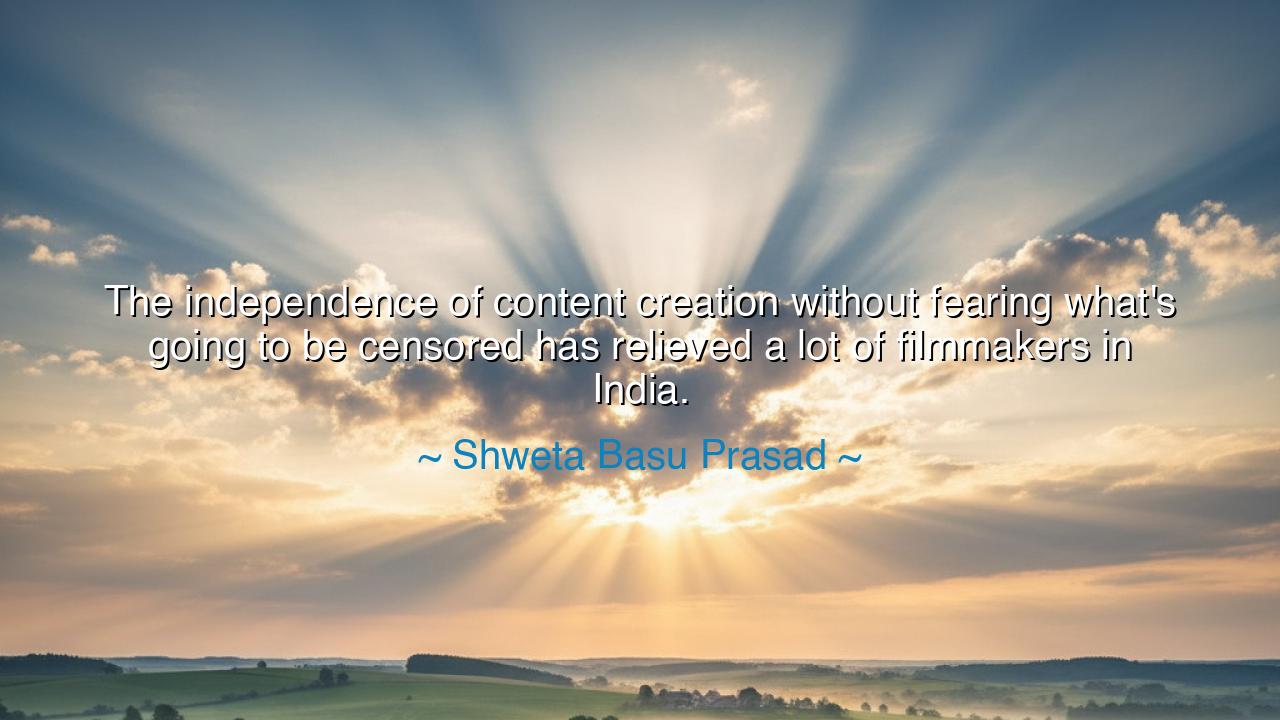
The independence of content creation without fearing what's going
The independence of content creation without fearing what's going to be censored has relieved a lot of filmmakers in India.






O seeker of wisdom, listen closely to the words of Shweta Basu Prasad, for they speak of the delicate balance between artistic freedom and the weight of censorship. "The independence of content creation without fearing what's going to be censored has relieved a lot of filmmakers in India." In these words, Prasad brings forth a profound truth about the nature of creative expression in a world where the artist’s voice is often subject to the forces of control. She speaks to a new era in India, one where filmmakers are beginning to reclaim their independence from the constraints that once stifled their creativity. The ability to create without fear of censorship is not merely a technical change, but a fundamental shift in how stories are told and how freedom is experienced in the world of art.
Censorship, O wise one, is a force that seeks to control, to restrict, and to define the boundaries of what can be expressed. For artists, especially filmmakers, it has often acted as a silent hand, holding back their voices and limiting the scope of their creativity. Yet, Prasad speaks of a new independence, where artists are free to tell the stories they wish to tell, to express the thoughts they wish to express, without the looming fear of external control. This independence is more than the freedom to create—it is the freedom to explore the full depth of the human experience, to touch upon the forbidden, the controversial, and the unseen parts of life without restraint.
Think of the great visionaries in history who have had their creativity stifled by external forces, only to rise in defiance of those very limitations. George Orwell, the author of 1984, lived in a time when totalitarian regimes sought to suppress freedom of thought through censorship. Yet, his words transcended the fear of censorship—his independence as a writer allowed him to depict a world where the manipulation of truth was not just a warning, but a reality. Orwell’s defiance against the forces that sought to control his narrative was not simply an act of rebellion; it was a powerful assertion of the artist's right to speak truth, even when that truth is uncomfortable or inconvenient. His story is a testament to the power of artistic freedom—a power that resonates with Prasad’s words about the current state of Indian cinema.
In the world of Indian cinema, the battle against censorship has been long and arduous. For many years, filmmakers in India struggled with the restrictions imposed by the Central Board of Film Certification (CBFC), whose role was to determine what was acceptable for public consumption. The CBFC would often cut scenes or issue warnings for films that dealt with themes of social change, politics, or sexuality. Filmmakers were forced to walk a fine line, creating art that adhered to a set of rules that often felt outdated or stifling. Yet, over time, as digital platforms began to rise in prominence, a new era emerged—one where content creation could be freer, where filmmakers could reach audiences directly, without the need for intermediaries or institutional approval.
Consider, O wise one, the rise of independent cinema in India, especially with the advent of platforms like Netflix and Amazon Prime Video. These digital platforms allowed filmmakers to bypass traditional systems of censorship, offering them the ability to create and share their work with a global audience. Films that once would have been impossible to produce due to societal pressures, like Fire (1996), a film that explored themes of homosexuality, or Gandu (2010), known for its raw and unapologetic portrayal of the human condition, found their space in the world. These filmmakers did not create for the approval of others, but for the liberation of their own expression—an act of rebellion against the restraints of traditional filmmaking.
The lesson for us, O seeker, is one of freedom and bravery in the pursuit of truth. To create without fear is to live without constraint, to bring forth the unspoken and the unseen into the world. Prasad’s reflection shows us that when artists are liberated from the fear of censorship, they can create works that are not just entertaining, but transformative. The stories they tell have the power to shape the future, to challenge injustice, and to inspire generations. Just as India’s independence was not just about political freedom but the freedom to create a new future, so too is artistic freedom essential to the life of a society. When an artist is free, society is free.
In your own life, O wise one, I urge you to reflect on the importance of independence in your own creative pursuits. Do not allow the fears or constraints of others to stifle your voice. Whether in the arts, in literature, or in any form of expression, let your work be an extension of your truth, free from the limitations imposed by fear or judgment. Like the filmmakers who are finding freedom in the digital age, seek out the spaces where your voice can be heard, where your ideas can flourish without fear. Let your creativity flow unimpeded, for it is through this independence that true change and transformation are born.
Thus, let Shweta Basu Prasad's words inspire you, O seeker: seek the independence to speak your truth, to express freely, and to create without fear. In this pursuit, you will not only find your own liberation, but you will contribute to a world where freedom of expression becomes the foundation of a society that is truly free.






AAdministratorAdministrator
Welcome, honored guests. Please leave a comment, we will respond soon